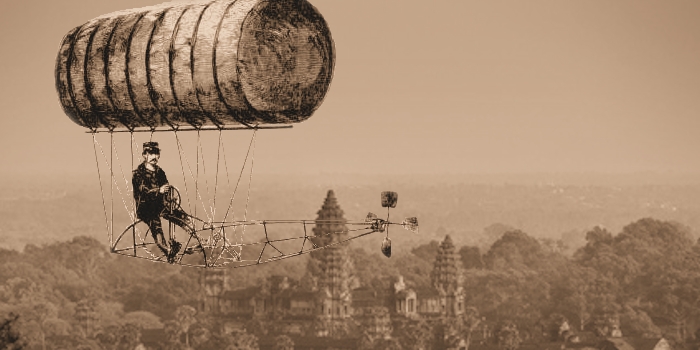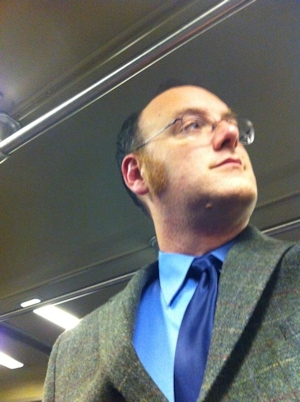
Tiny sparks in the transvisor gave it life, the inviting warm glow building in the lens hood. The familiar tang of ozone and hot selenium followed, and soon the xerographic plates were clacking through the drum, giving a jerky-but-animated view of something happening at the other end of the wire. Deep in the transvisor’s oak cabinet, the speaker horn crackled as the machine caught up with the emanations already in progress.
The cascade of plates past the viewing lens showed a man in a now-unfashionable khaki vest and pith helmet speaking directly into the distant camera. The overall sepia-tone of the transvisor picture made it impossible to tell any other colors, but the cut of the khaki was unmistakable. Eventually, his voice caught up.
“—nnual running of the Angkor Distance Trial. It’s a glorious day here in the monsoon latitudes, a glorious day for flying. This is Wallace Carroll, reporting over the Commonwealth Trans-Pacific Cable for the Royal Air Sports Society, and with me here at the starting line booth is my colleague from the Canberra Pedal-kite Association, Mister Bryce Prehm.”
The view flickered aside to show a shorter, stouter man, with a mustache as out of date as Carroll’s vest. “G’day! And I concur! Glorious!”
Carroll appeared again suddenly, as if a few plates were missing. “—ing the spectators, who’ve turned out in fine array to watch the start of the great race. Or rather, distance trial.”
“Quite!” added Prehm. “There’s the King just now!”
Behind the announcers moved a mass of people, forested with parasols and silk hats. The odd Raj-pattern jacket or flowing sabai stood out, but the costume of the spectators remained largely Western.
“Yes, it’s possibly too far for a good image, but I see His Majesty Rama the Fifth, the official host of events here in ancient Siam.”
There was another skip, and the announcers were now seated at a table with the kites staging behind them. Again, the voices struggled to keep up as Carroll was already speaking.
“—the difference between a distance trial and a race. Instead of a set course to cover, and the contestants vying for the best time, here there is a fixed time, and the contest will be decided by who covers the greatest distance in it.”
“Quite!” Prehm added. “And I think we know who that will be!”
“Indeed, despite the large field this year, there are only two real contenders: the Royal Society’s Winged Sofia, and Edinburgh Sodality’s Fulminating Angel. That’s Angel there, with her four great Da Vinci-style helical screws abreast the narrow gasbag, and Sofia slightly more distant, with those great bat-like wings folded up.”
Prehm and Carroll regarded the machines lined up on their launch rails, dark gasbags like rows of hills.
“A Turk flying for Scotland, and a Scottish colleen for England!”
“Yes, that’s how it seems.” Carroll turned back to smile at the camera. “Edinburgh has spared no expense for their intended victory, hiring world champion Nasir Ozalan away from the Ottomans for this event.”
An image of a gun flashed, no more than a single plate.
“They’re off!” Prehm and Carroll said in unison.
The machines lurched, flapped, paddled, and reluctantly left the rails, headed inland.
“The most exciting hour in aviation is now underway,” Carroll continued. “Oh! Trouble already, it seems. Prehm, who is that fouled? Can you see?”
“The German! The German and the other German!” Prehm’s voice came faintly, as he had set down his microphone to keep field glasses on the starting rails.
“Yes, Albatros and Möwe have crossed airscrews right off the rails, it seems. That’ll be irreparable in the time remaining, even if it hadn’t cost them distance.”
“Bad show!” Prehm agreed. “Look at that Turk go! Flapping like a mad hen!”
The image centered on Winged Sofia as the semi-ornithopter climbed above the pack. The figure of the pilot was just visible in the cables and struts, working hard to make the complex flapping mechanism go.
“A risky strategy by Ozalan, lofting for altitude this early. We’ll have to see how this pays off for him down the course. Macmurray is off ahead of the pack already, I see. Can you get the camera on her?”
The long slender gasbag of Fulminating Angel was already foreshortened as it left the starting area. Though it was disappearing quickly, it was still distinct with its double rotary wings.
“There’s another one wearing out early!” Prehm said, returning to his microphone. “Stout Scotswoman or not, she’ll pay for that come the hills!”
“We shall see,” Carroll said, the taller man moving across the view. “But in order to do that, we’ll have to follow the action from the camera train, and quickly.”
Several plates’ worth of an engraved card reading SWITCHING CAMERAS, EVENT WILL RETURN SHORTLY appeared; then the view was back. Inside a sparsely-appointed car with one side completely open to the air for better views, the two announcers took seats to either side of the camera.
“Welcome back!” said Prehm, waving at the scene outside. “It’s a two-kite race, just as we predicted!”
“Quite so,” agreed Carroll, not as effusive as the shorter Australian. “Macmurray is well ahead of the pack, Ozalan less so, though he has a commanding altitude advantage which he’ll be able to capitalize on later. Winged Sofia is a marvel of the aeronautic arts, and the doughty Turk will need every yard he can wring from it today.”
“Fulminating Angel, as well!” said Prehm. “My sources from the Sodality tell me their kite was over a hundred thousand Sterling in development alone! Smashing!”
Carroll looked a bit dyspeptic, but didn’t pause long. “You can just see Macmurray’s figure in our long lens there, thrashing limbs clearly visible despite her flying costume.”
“I say!” Prehm cut in. “Let’s not dwell on things unseemly!”
“Nevertheless,” Carroll went on, “it’s clear she’s having to work very hard maintaining that lead. Ozalan, in his revolutionary machine, is poised to take the lead from the Scot aviatrix whenever he wishes.”
“Nonsense!” huffed Prehm. “The Turk’s falling even farther behind! And there’s hills coming up!”
Carroll made a show of cleaning his monocle. “I think time and feminine frailty will tell the story of this race.”
The two men seemed to notice each other for the first time. The image wavered, whoever was operating the camera clearly unable to decide whether the drama in the foreground or the distance was more important.
Another machine grounded behind them, going end-over end in a crumpling mess of vanes and torn rubberized cloth. The synchronized gasp of the train passengers brought Carroll and Prehm back to the event.
“Look there!” Prehm pointed. “The Walloon! Clipped a hummock!”
Carroll picked up the thread as if nothing had happened. “Indeed, the Avions du Sud Belgique entry has relied too closely on ground effect. That’s an ugly tangle of contraption, but we cannot tarry to see if the pilot is unharmed. On with the race!”
“Trial!” Prehm corrected.
There was a sudden jump as the scene changed considerably, more trees visible as tropical hills moved slowly past in the background.
“These are the trials that break the hearts of men,” said Carroll from off-scene. “There in the center of your picture is Winged Sofia, and Ozalan’s altitude advantage has been eaten up by the Tenasserim Hills already.”
The view shifted up the slope.
“Breaks the hearts of women, too!” Prehm cut in, leaning in from the side of the picture over the struggling Angel. “Macmurray’s not moving so fast now!”
The camera jerked back, to reveal Carroll instantly banishing a fearsome snarl for his bland announcer’s smile. Behind him, distant pedal-kites were fading behind the train.
“No one’s moving very fast now, not on these inclines. But the race is Macmurray’s to win or lose as we approach the highest point of the course ahead, just above the teak trees of Three Pagodas Pass.”
Prehm pushed into the frame. “Ozalan’s fresh, Macmurray’s tired! And a woman!”
Carroll’s smile wavered, but he gestured to the leading pair, which the camera followed. “The untested Royal Society design may prove its worth on the downslope, but I think time will show that Macmurray has pedaled her way into the history books today—”
“I think time will show that you’re in the employ of Edinburgh!” Prehm slapped a folded paper from his waistcoat pocket down on the standing table, rattling the men’s gin and tonics.
“Where some may see partisanship,” Carroll said through gritted teeth, “others might see a reasonable judgment of sporting chances.”
“Ha! I have proof!” Prehm smacked the paper again, drenching it in quinine-flavored gin. “Here to promote Edinburgh’s shoddy work! And stack the deck for a weak competitor!”
“At least I’m not here rooting for the wog, you Antipodean twit!”
“You dare, sir!”
Carroll’s eyes bugged out farther than looked healthy. “Dare? There’s a fat cheque from the Royal Society in your accounts for the very same reason!”
“Oh, you liar!”
The blow came too fast for the old transvisor camera, which only caught a blur of silver-tipped black wood cane between plates, and then Prehm was spitting blood and winding his hands up in Carroll’s jacket collar. The cameraman gave up any pretense of following the two semi-airships as they tipped over the tree-covered hill.
The transvisor set seemed to freeze for a moment, locking Carroll and Prehm with particularly lupine snarls as the two grappled in a blur of poorly-captured motion. The set’s whine and clatter increased in pitch as it revved up to modern plate frequency. The picture shrank, and brightened, and two figures stepped in from either side.
“And we all know how that fight turned out,” said the woman with a slight Scottish burr. She gestured to the other side of the screen, showing off her trim business dress in a much less faded sepiatone.
The swarthy man in the rich Oriental embroidery picked up the cue. “Carroll versus Prehm became the greatest sensation transvisor sport had yet seen. Raw, unchanneled fury between two disputants with real grievances to settle.”
“It would have gone better for Carroll if he’d settled it our way,” said the woman. “You almost had me on the downslope.”
“If only the cameras had been on us,” Ozalan said, looking theatrically away so that the tassel on his fez swished. “But I concede that Prehm beating Carroll to death made for a better show.”
Macmurray grinned for the camera. “It’s been ten years since Siam, and we’re ready to see who will step into the long line of champions founded that day. Today we have Hugo Vanvalkenberg, a solicitor from The Hague with a grievance I hear stems from an incident on a tramcar!”
Ozalan adjusted his jacket cuffs nonchalantly. “That’s right. And his opponent is a banker from Rotterdam, a Herr Dans Srijken. Am I pronouncing that right? Strijken? And now they have agreed to settle the matter finally before our cameras.” Ozalan turned on his best deep-throated Turkish accent. “Let’s see who’ll walk away from this duel of the white collars.”
The two former athletes leaned in towards the camera, all smiles. “It’s Fight Night!”
 S. Hutson Blount has had the usual odd employment history common to those engaging in the disreputable business of fiction. Though possessing no higher education, he pretends that his Navy technical training counts as college. He was spotted in Seattle in the summer of 2005 associating with more talented graduates of his Clarion West class. When he’s not thinking up more ways to tell lies to people for money, he masquerades as a devoted husband. His novel Aetheria is available on the Amazon Kindle.
S. Hutson Blount has had the usual odd employment history common to those engaging in the disreputable business of fiction. Though possessing no higher education, he pretends that his Navy technical training counts as college. He was spotted in Seattle in the summer of 2005 associating with more talented graduates of his Clarion West class. When he’s not thinking up more ways to tell lies to people for money, he masquerades as a devoted husband. His novel Aetheria is available on the Amazon Kindle.
 Aetheria Peregrine set out for a career as a merchant spacer–a career cut short in a whirlwind of events. Caught up in the tumult of planetary empires set against each other, she must by turns become a pirate, doctor, ice miner, drug dealer, vagabond, mystic, spy, secret policewoman, pilgrim, fugitive, heiress, scholar, and diplomat.
Aetheria Peregrine set out for a career as a merchant spacer–a career cut short in a whirlwind of events. Caught up in the tumult of planetary empires set against each other, she must by turns become a pirate, doctor, ice miner, drug dealer, vagabond, mystic, spy, secret policewoman, pilgrim, fugitive, heiress, scholar, and diplomat.
She faces the opportunities and dangers of a hostile galaxy armed with the only things she can depend on: her wits, her unquenchable drive for love and success, and the flexible ethics of a practiced conwoman.
Befriended, betrayed, recruited, exiled, and more in the course of her travels, Aetheria can be anything except stopped.








































